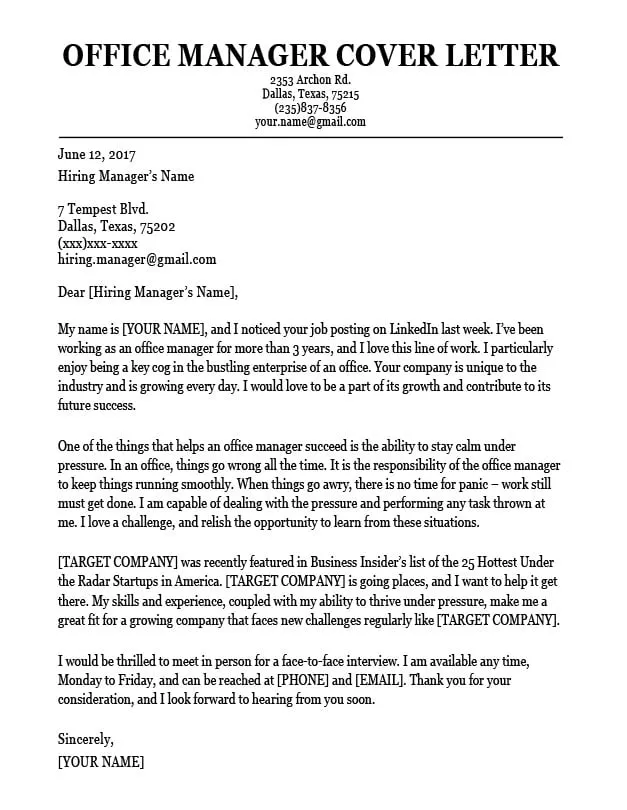Understanding the Office Manager Role
An Office Manager is the linchpin of any well-functioning workplace. They wear many hats, from administrative tasks to personnel management, ensuring the smooth and efficient operation of an office. Understanding the multifaceted nature of this role is the first step in crafting a cover letter that resonates with potential employers. The responsibilities are diverse, demanding a unique blend of organizational skills, interpersonal abilities, and technical proficiency. A good Office Manager anticipates needs, solves problems, and creates a positive and productive environment for all employees. They are often the first point of contact for visitors and the backbone of day-to-day operations.
Key Responsibilities of an Office Manager
The core duties of an Office Manager encompass a wide range of tasks. These include managing office supplies and equipment, overseeing administrative staff, handling correspondence and communication, coordinating schedules and meetings, and maintaining office records. Furthermore, Office Managers often play a crucial role in onboarding new employees, managing employee benefits, and ensuring compliance with company policies and procedures. Budget management, vendor negotiations, and facility management are also common responsibilities. The specific tasks may vary depending on the size and industry of the company, but the overarching goal remains the same to create and maintain an organized and efficient workplace.
Essential Skills for Office Managers
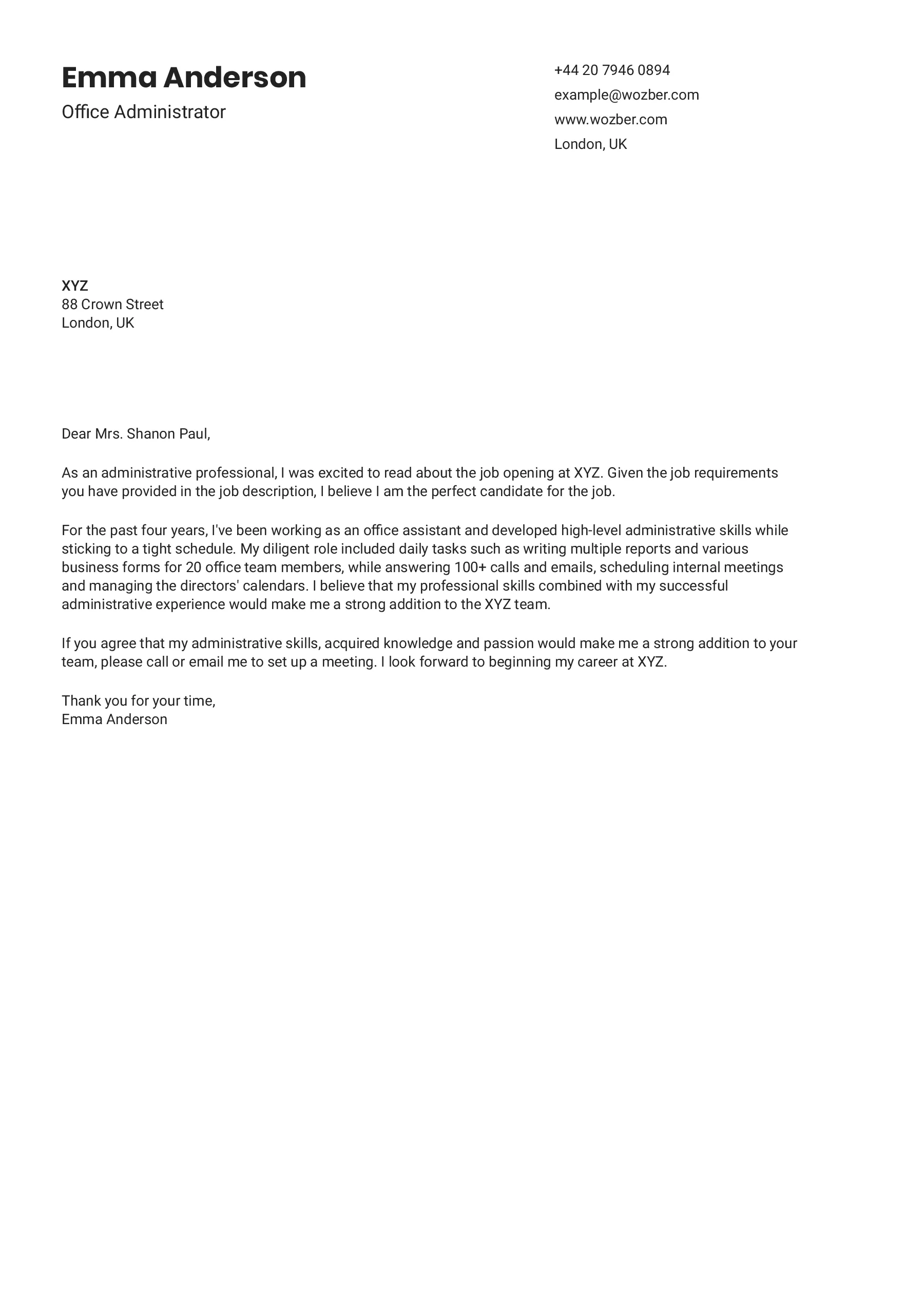
To excel in this role, Office Managers need a diverse skillset. Strong organizational and time management skills are paramount for prioritizing tasks and meeting deadlines. Excellent communication and interpersonal skills are essential for interacting with employees, clients, and vendors. Proficiency in relevant software, such as Microsoft Office Suite and other office management tools, is crucial. Problem-solving abilities, attention to detail, and the capacity to multitask are also highly valued. Leadership skills, including the ability to motivate and supervise a team, are often required. A successful Office Manager must be adaptable, resourceful, and possess a proactive approach to problem-solving. A good office manager also knows how to use office equipment, such as printer, fax machines, scanners and projectors.
Crafting a Compelling Cover Letter
A well-crafted cover letter is your opportunity to make a strong first impression. It should highlight your most relevant skills and experience, demonstrate your enthusiasm for the position, and showcase your understanding of the company’s needs. The letter should be tailored to the specific job description, emphasizing the qualifications and experience that align with the employer’s requirements. It should also convey your personality and communication style. The goal is to convince the hiring manager that you are the best candidate for the job and encourage them to review your resume in detail. It is vital to address the letter to the hiring manager. If you cannot find their name online, try calling the company or using LinkedIn to obtain it.
Header and Contact Information
Start your cover letter with a professional header that includes your name, address, phone number, and email address. Ensure that your contact information is accurate and up-to-date. If you have a LinkedIn profile or a professional website, include the URL in your header. This section should be clearly formatted and visually appealing, providing the hiring manager with easy access to your contact details. Always include the date and the hiring manager’s name, job title, company name, and company address. This is a basic but important part of professional correspondence.
Professional Greeting and Introduction
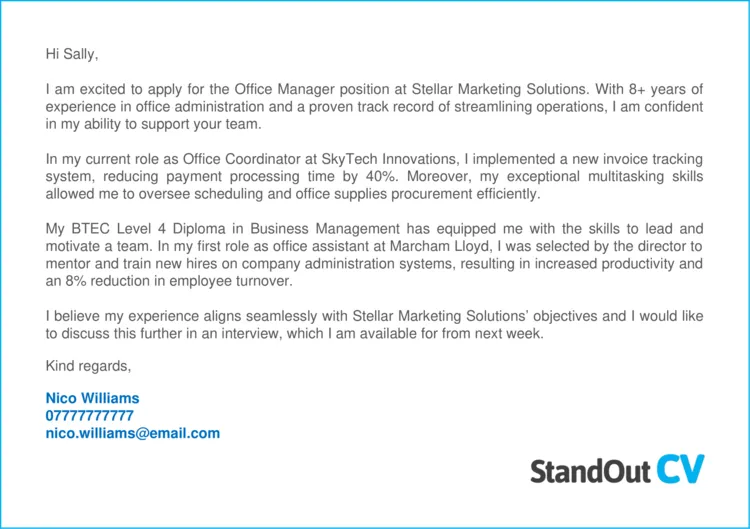
Use a formal and professional greeting, such as “Dear Mr./Ms. [Last Name],” if you know the hiring manager’s name. If you are unsure of the hiring manager’s name, use a more general greeting like “Dear Hiring Manager.” In your introduction, state the position you are applying for and briefly explain where you saw the job posting. Immediately capture the reader’s attention by stating your strongest qualification for the job or by expressing your genuine interest in the company. Keep this section concise and impactful, setting the tone for the rest of your cover letter. This section is to make the hiring manager want to read the rest of your letter.
Highlighting Relevant Skills and Experience
The body of your cover letter is where you demonstrate your qualifications. Focus on the skills and experience that are most relevant to the job description. Provide specific examples of how you have successfully performed the duties and responsibilities outlined in the job posting. Use keywords from the job description to ensure your letter aligns with the employer’s needs. Tailor your language and examples to showcase your ability to excel in the Office Manager role. This section is about matching your experience to the job description as closely as possible.
Quantifying Achievements and Contributions
Whenever possible, quantify your achievements to demonstrate the impact of your work. Use numbers and data to illustrate your accomplishments. For example, instead of saying “Improved office efficiency,” say “Improved office efficiency by 15% through the implementation of a new filing system.” Quantifiable results make your claims more credible and show the hiring manager the value you can bring to their organization. This will make your resume stand out from other applicants. It will help the hiring manager imagine the positive impact you would have on their team.
Tailoring Your Letter to the Specific Job
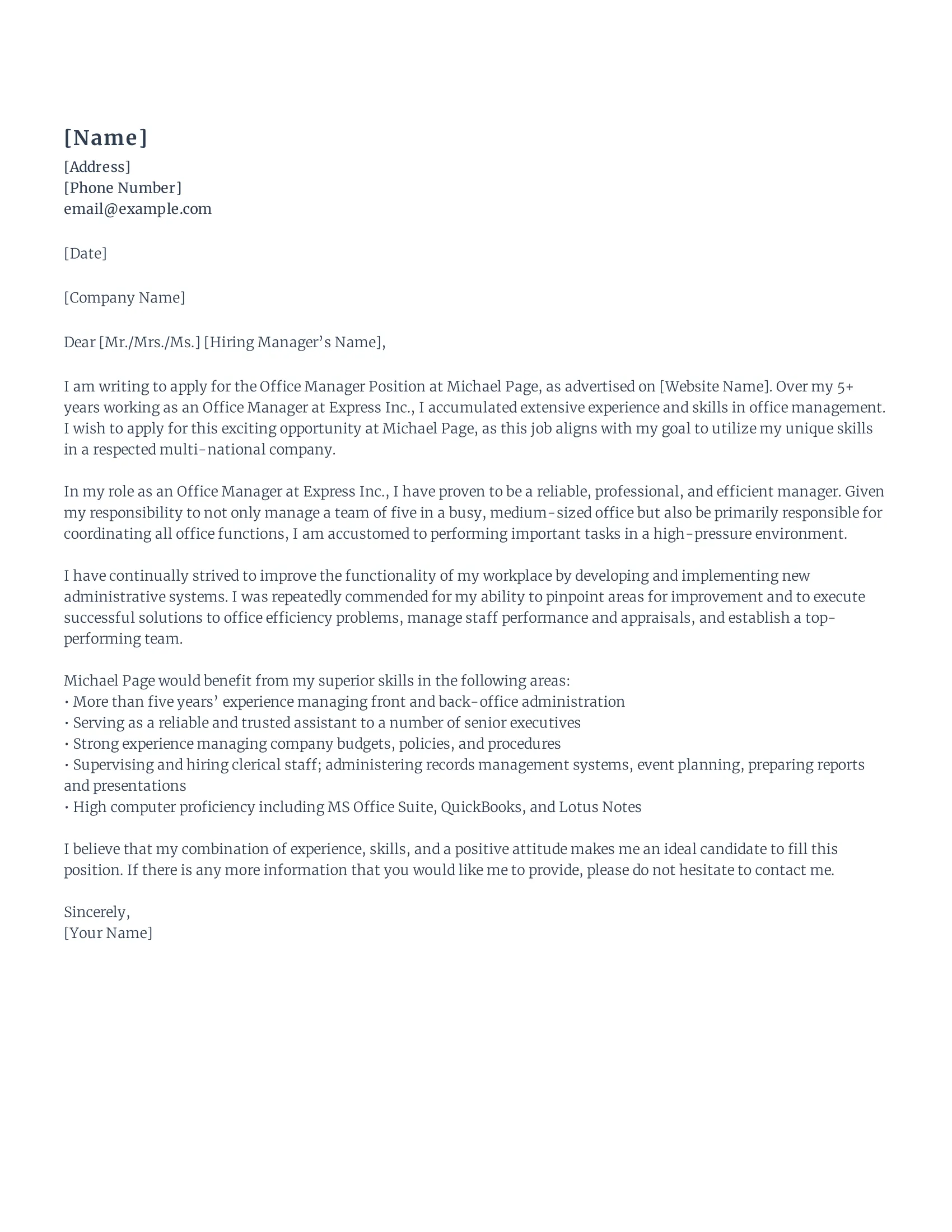
Customize each cover letter for the specific job you are applying for. Do not send a generic letter. Review the job description carefully and identify the key requirements. Then, highlight the skills and experience that directly align with those requirements. Research the company and its values to understand its culture. Demonstrate how your skills and experience align with the company’s goals. This level of personalization shows the hiring manager that you are genuinely interested in the position and have taken the time to understand their needs. A generic letter will signal to the hiring manager that you are not genuinely interested in the position. Tailoring your letter requires time and patience.
Demonstrating Enthusiasm and Fit
Express your enthusiasm for the position and the company. Explain why you are interested in the role and what attracts you to the organization. Show that you have researched the company and understand its mission and values. Demonstrate how your personal and professional goals align with the company’s objectives. Your passion and enthusiasm will make you stand out from other candidates. This will make you a memorable candidate. A hiring manager will want to hire someone who is excited about the company and the role.
Formatting and Proofreading Your Cover Letter
The format and appearance of your cover letter are critical. Use a professional font, such as Times New Roman, Arial, or Calibri, in a readable size (11 or 12 points). Use clear formatting, including consistent margins, spacing, and bullet points (if applicable). Ensure that your letter is easy to read and visually appealing. Before submitting your cover letter, meticulously proofread it for any grammatical errors, spelling mistakes, or typos. Ask a friend, family member, or career advisor to review your letter for you. A well-formatted and error-free cover letter shows your attention to detail and professionalism. This will give you the best chance of making a good first impression.
Common Mistakes to Avoid
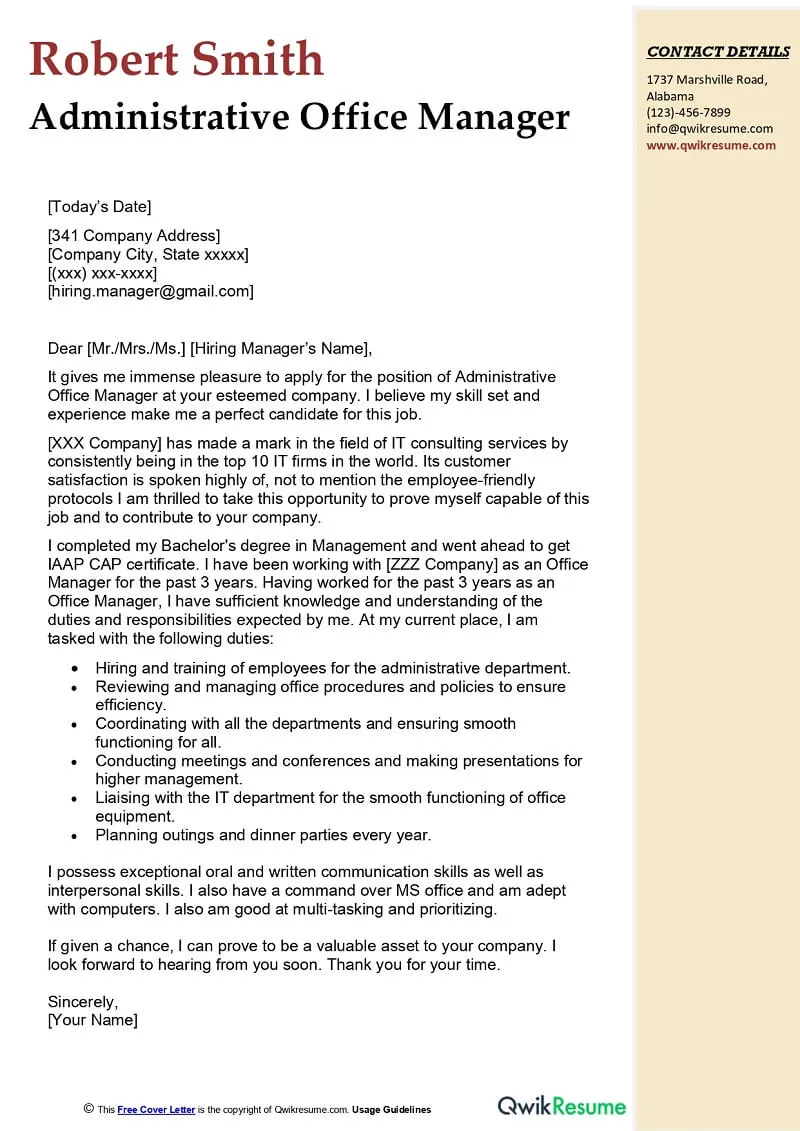
Avoid common mistakes that can undermine your application. Do not send a generic cover letter. Do not use jargon or overly complex language. Avoid spelling and grammatical errors. Do not include irrelevant information or topics. Do not be overly casual or informal. Do not exceed one page in length. Refrain from negative comments about previous employers or colleagues. Proofread your cover letter multiple times before submitting. These tips will help you submit the best cover letter possible. Make sure that you have the correct name of the hiring manager.
Using Strong Action Verbs
Use strong action verbs to make your accomplishments stand out. Start each bullet point or sentence with an action verb, such as “managed,” “coordinated,” “implemented,” “achieved,” “developed,” or “improved.” Action verbs convey your skills and abilities effectively. They make your cover letter more dynamic and engaging. They bring your experiences to life. Avoid using passive voice and weak verbs. This will make your cover letter more readable. Strong action verbs make your cover letter more persuasive.
Proofreading for Errors
Proofread your cover letter meticulously for any errors. Check for spelling mistakes, grammatical errors, and typos. Review the letter for clarity and conciseness. Ensure that your sentences are well-structured and easy to understand. Read your cover letter aloud to catch any awkward phrasing. Ask a friend, family member, or career advisor to review your letter. A polished and error-free cover letter demonstrates your professionalism and attention to detail. Proofreading is essential for a cover letter. It is just as important as making sure that your resume is perfect.
Office Manager Cover Letter Examples
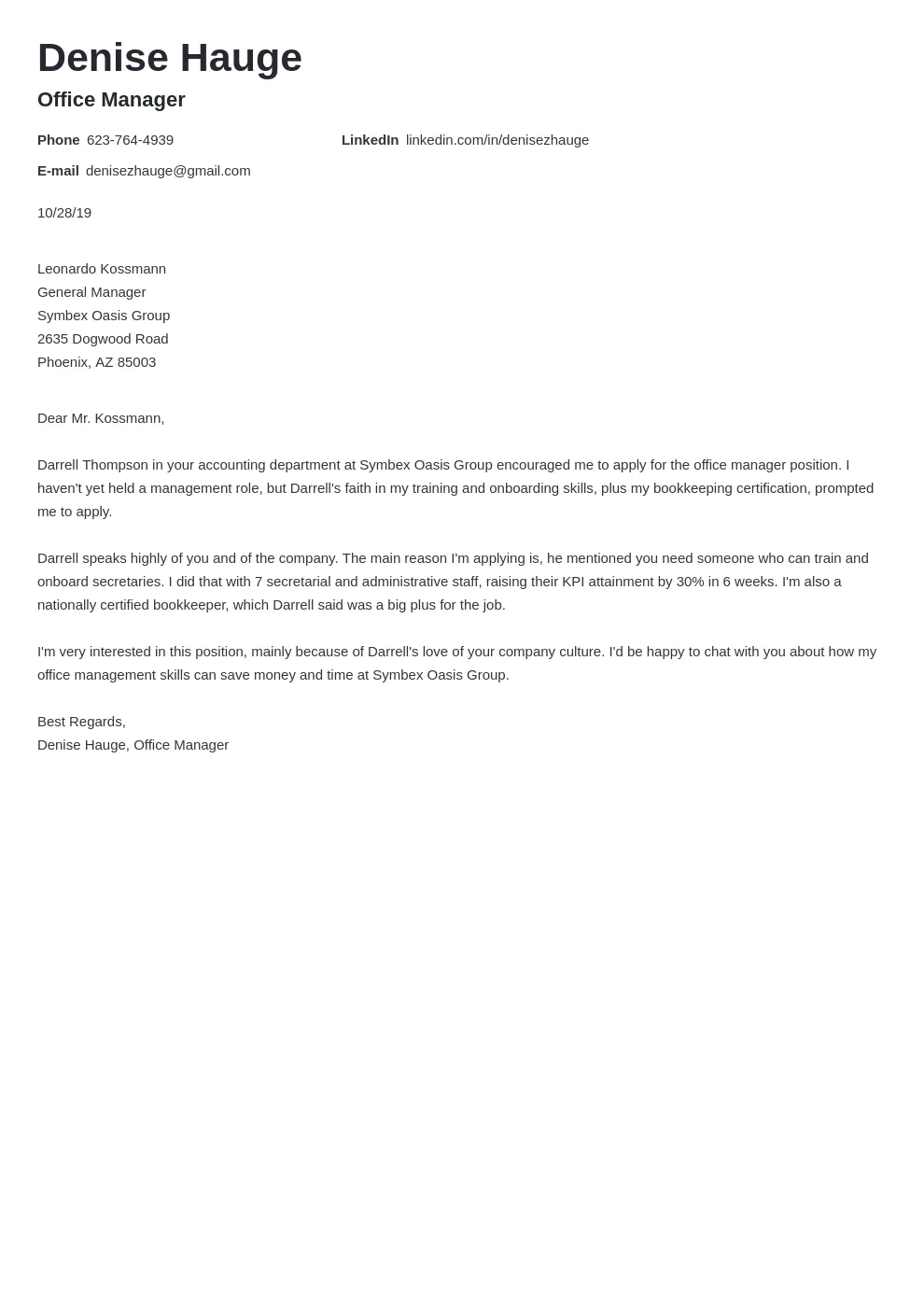
Here are example cover letters to give you a starting point. Note that these are meant as templates. Please take the time to customize each example. Make sure to incorporate your own information to make them unique. Always adapt the examples to fit the specifics of the job description.
Example 1 Skills-Focused
This example emphasizes your skills and abilities, highlighting the core competencies needed for the Office Manager role. This format is ideal if you have a wide range of skills. It can also be used if the job description focuses heavily on certain abilities. Highlight your core competencies by showcasing the experience and skills most relevant to the job. Emphasize the results you achieved with these abilities.
Example 2 Experience-Focused
This example focuses on your professional experience, detailing your accomplishments and responsibilities in previous roles. This is perfect if you have a long work history in a similar role. Focus on the results you have achieved in these roles. Use numbers to quantify your achievements. This will help the hiring manager see how you have made a difference in previous roles.
Example 3 Hybrid Approach
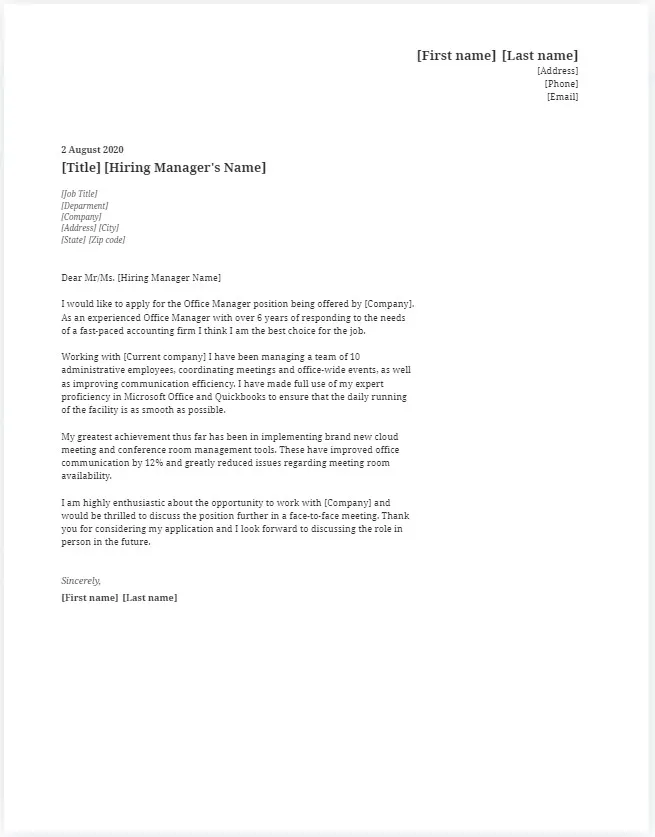
This example combines elements of both skill-based and experience-based formats. It is suitable for most Office Manager roles. This approach is versatile. It allows you to highlight your key skills and experiences. This format is a great option for most applicants.
Tips for Adapting These Examples
Customizing for Different Industries
Adapt your cover letter examples based on the industry you are applying to. Office Manager roles vary in different industries. Some industries require specialized experience or knowledge. Some industries include: healthcare, technology, and finance. Tailor your cover letter to highlight relevant skills and experience. Research the industry to understand specific terminology. This is a crucial step in making your letter appealing.
Including Keywords from the Job Description
Include keywords from the job description in your cover letter. This ensures that your application will pass through Applicant Tracking Systems (ATS). ATS are used by companies to filter applications. Use keywords naturally throughout your letter. Do not stuff your cover letter with keywords. This will improve your chances of getting an interview.
Finalizing and Submitting Your Cover Letter
Reviewing and Refining
Before submitting your cover letter, review and refine it. Ensure that all information is accurate. Correct any errors. Refine the language to ensure clarity. Make sure your cover letter is the best it can be. A well-crafted cover letter shows your attention to detail. A great cover letter will separate you from the crowd. Always proofread the cover letter at least once.
Submitting Your Application
Follow the instructions provided in the job posting for submitting your application. Usually, you will submit both your resume and cover letter. Make sure that your files are named properly. Ensure that your files are in the required format (usually PDF). Double-check to ensure that all attachments are included. After submitting, follow up with the hiring manager to confirm receipt. Follow-up demonstrates your interest and professionalism. This will make a great impression on the hiring manager.
